Auckland Zoo flooded after Friday’s major rainfall.
Photo: Auckland Zoo
MetService has issued a series of orange and red heavy rain warnings for Northland, Auckland, Coromandel and Bay of Plenty.
The red heavy rain warning is in place from midnight 31 January until 6pm 1 February for Coromandel Peninsula, from 31 January 5pm until 1 February 5am for Auckland north of Orewa, and for Northland 24 hours from 31 January 4am.
Due to the red level weather warnings, the National Emergency Management Agency have issued advice on how to keep safe, scroll down to find the full list below.
An orange heavy rain warning is in place for Auckland from Orewa southwards, and Great Barrier Island, for 12 hours from 6pm 31 January.
The warnings have been triggered because of the likely impacts from the weather forecast, including significant flooding, slips, and further damage to roads and power networks, MetService said.
“Previous heavy rainfall since Friday means that these regions are already saturated, still cleaning up from the last event, and are vulnerable to further heavy rain.”
There is the added risk of thunderstorm starting from Northland on Tuesday and spreading over northern Auckland from Tuesday evening and then further south into Coromandel on Wednesday.
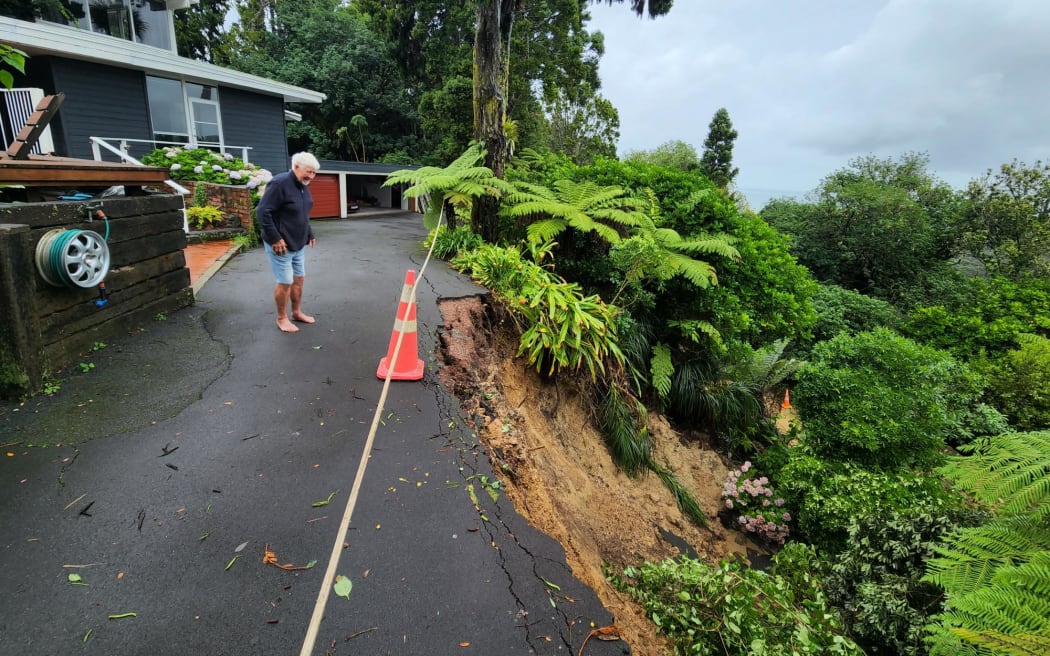
This man’s driveway slipped onto Ototori Bay Road in Titirangi.
Photo: RNZ / Mohammad Alafeshat
The West Auckland suburb of Titirangi has been hit particularly hard by flooding and slips, with multiple locals forced to evacuate, roads cut off and some residents without water for days.
Auckland Emergency Management said 69 red placards and 300 yellow placards have been issued to residential and commercial buildings.
A red placard means access to the building is prohibited, as it is deemed too dangerous to inhabit.
Auckland Zoo will be closed for at least the week after raging flood waters up to a-metre-and-a-half-high swept through the complex.
A neighbouring creek breached its banks, forcing staff to move animals to higher ground.
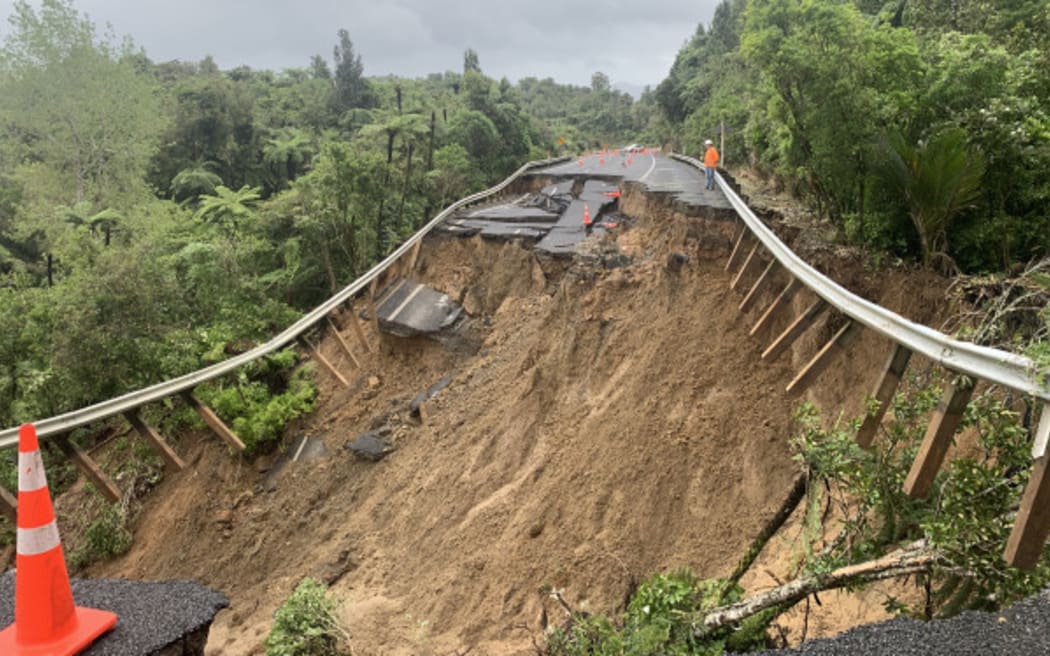
State Highway 25 over the Coromandel has completely collapsed at the summit.
Photo: Supplied / Waka Kotahi
Thames Coromandel Civil Defence Controller Garry Towler is warning residents across the region to prepare for the next bout of bad weather.
“The regional council have serious concern that the land stability that the land around the Coromandel could be compromised due to sheer saturation.
“That means that lives on a hilly section needs to keep an eye on are there any cracks and that sort of thing, because there is evidence that’s starting to occur.”
Meanwhile, the Ministry of Education has directed all Auckland schools, early childhood services and tertiary institutes must remain shut for physical instruction until 7 February.
Principals were told the instruction was issued after the National Emergency Management Agency asked the ministry to help minimise traffic on Auckland roads while vital infrastructure is repaired.
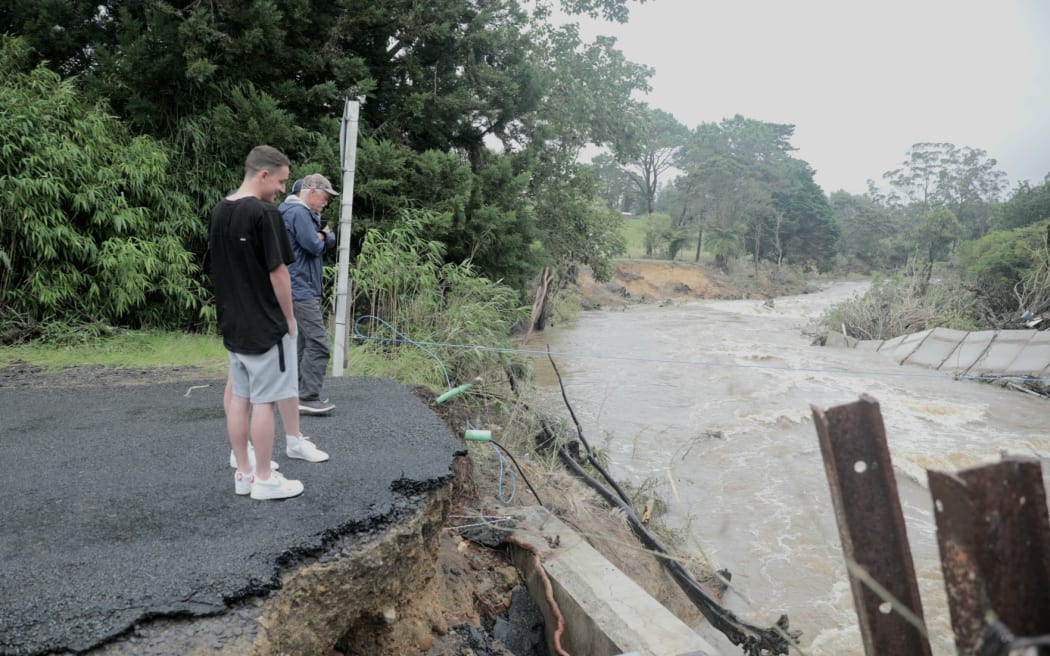
Photo: RNZ/ Nick Monro
Auckland Transport is also urging people to work from home if possible and avoid unnecessary travel tomorrow as the city’s long weekend for its anniversary ends.
Executive general manager Andrew Allen told Checkpoint public transport systems would be running and roads reopening, but they would be operating at a reduced capacity.
The Auckland Harbour Bridge was still at risk of closure as there was a strong wind watch in place for Tuesday.
Air New Zealand also announced it was temporarily focusing its efforts on rebooking 9000 passengers whose travel plans had been disrupted by the deluge. It was also offering a $250 accommodation goodwill payment for those displaced.
Auckland Airport last week was forced to shut after the rain flooded the interntational terminal and the runway lights were also damaged by a plane. It reopened to flights and passengers over the weekend.
While it was still too soon to know the full extent of the damage to Auckland’s businesses and trade, Infometrics principal economist Brad Olsen said based on population data and previous flooding events, the event could cost the economy about $446 million.
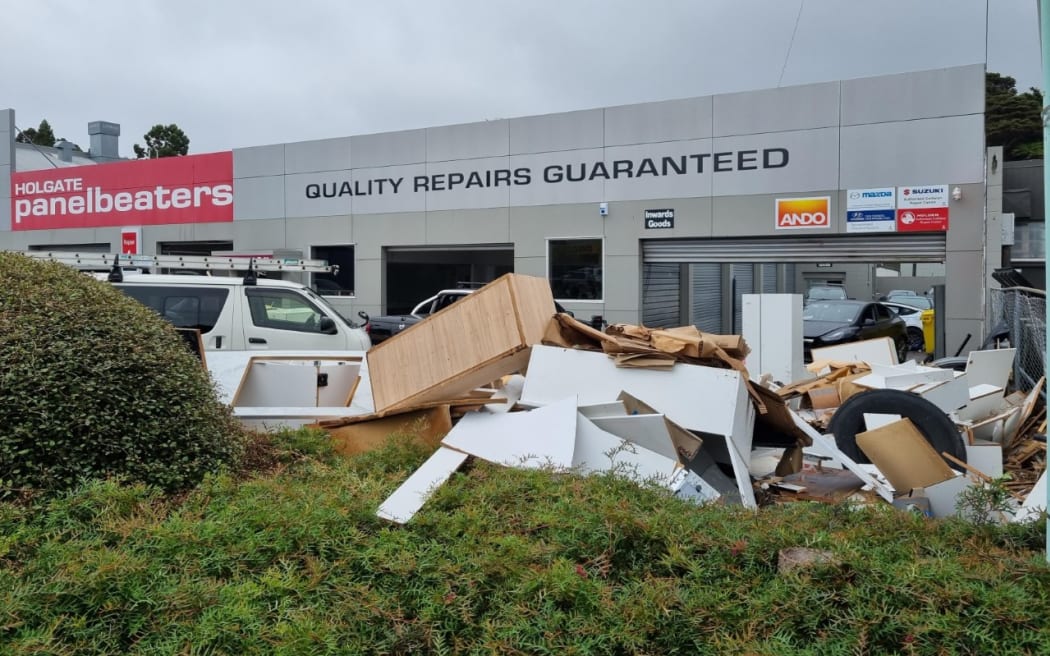
Auckland’s northwest is reeling for the second time in 18 months, from a major flooding event.
Photo: RNZ/Rayssa Almeida
After the heavy rain on Friday, dozens of small businesses on the North Shore’s Beach Road, Browns Bay, saw their shops flooded, their equipment written off and thousands of dollars down the drain after waist-high water took over their businesses.
A 57-year-old man is facing burglary charges after products were taken from a vape store in the Wairau Valley, on the North Shore.
Police superintendent Shanan Gray told Checkpoint patrols had been stepped up across the city.
Families in South Auckland’s Māngere told RNZ how their children and elderly were left to brave the torrents to get to safety after their homes were rapidly flooded.
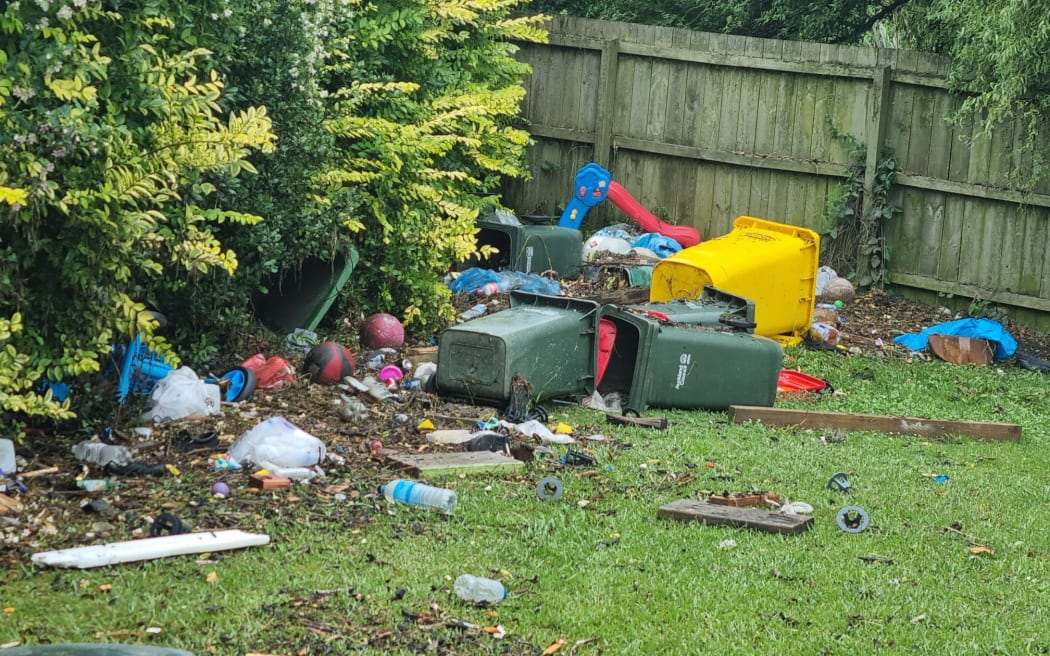
Business owner Mathew Coles says he saw his Kitchen Design business under water in a matter of seconds.
Photo: RNZ / Jonty Dine
Māngere community leader Dave Letele told Checkpoint the official response to the disaster was slow on Friday when it happened, and continued to call on the mayor’s resignation.
While Mayor Wayne Brown today acknowledged that there were some “hiccups” in the response on Friday, he said a review into all officials’ actions would be undertaken.
“I accept that communications including mine and my office were not good enough, especially on Friday night.

Auckland Mayor Wayne Brown speaking to the media about the Auckland flooding on 30 January 2023.
Photo: RNZ / Finn Blackwell
“I don’t think I personally did anything wrong.”
He said the criticism would not lead to his resignation.
He previously defended himself against criticism that he did not call for a State of Emergency earlier, saying he followed the advice of the professionals when deciding whether to declare an emergency.
“The first thing from South Auckland came from customers in shops. I was quite surprised that it wasn’t coming back from the emergency management.
“I was put in touch with the duty controller who under the legislation is the person who is in charge actually.”
Other parts of the North Island also are being impacted by the weather. A Tauranga family of seven spoke to RNZ’s Midday Report about their dramatic escape from their house that was sliding down.
They thought they were in the middle of a huge earthquake when their home was hit by a slip which woke them up overnight on Saturday.
And farmers are also picking up the pieces as pastures are under water, crops have been destroyed and culverts and valuable feed have been washed away due to the heavy rainfall.
Because of the red level weather warnings issued for Auckland and the Coromandel Peninsula, the National Emergency Management Agency have posted advice on how to keep safe:
- Red weather warnings are the most severe warnings. The forecast weather could cause further flooding, slips and damage
- People should stay up to date with the forecasts from MetService and continue to follow the advice of civil defence and emergency services
- If you have evacuated, please stay where you are until you are given the all-clear to go home.
- Stay away from floodwater. Always assume that all flood water is potentially contaminated and ensure hands, clothes and property are thoroughly cleaned after contact with flood waters
- It is important to clean and dry your house and everything in it. Do not eat garden produce if the soil has been flooded
- Throw away all food and drinking water that has come in contact with floodwater, including things stored in containers
- Information about where to get help can be found on the Civil Defence website and from Auckland Emergency Management




















Discussion about this post